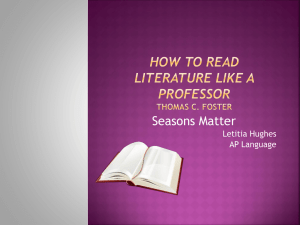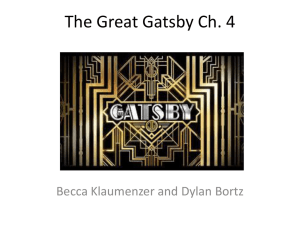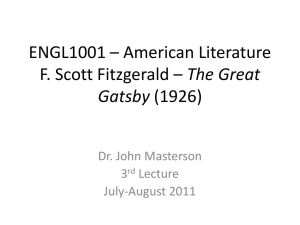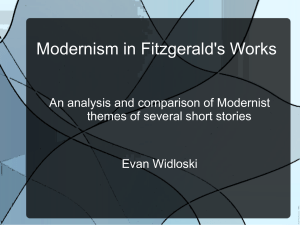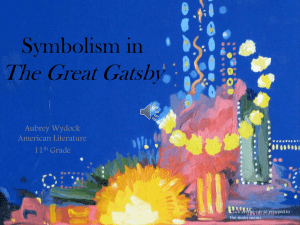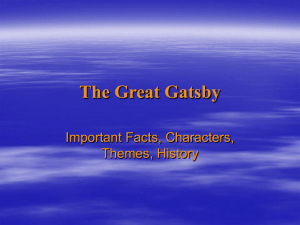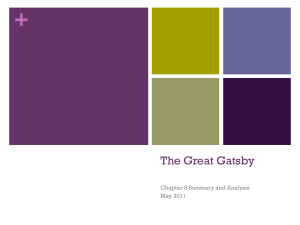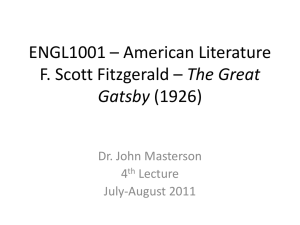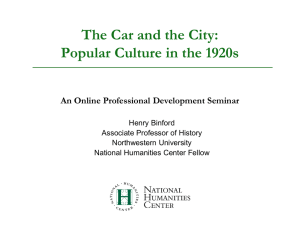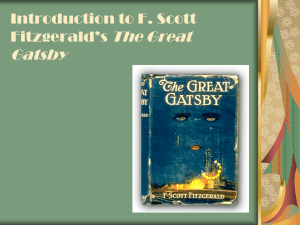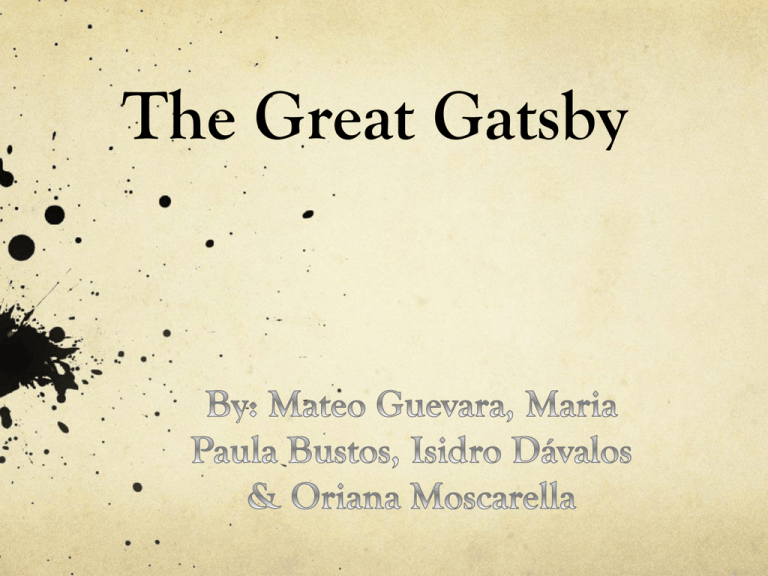
The Great Gatsby
Context
Roaring 20´s
Postwar economy (flourishing)
Consumerism/ Power/ Money
Debauchery
Alcohol prohibition
Corruption (bootlegging and other illicit activities)
Jazz age
Moral decay
Context
The US was in a postwar period in which they
were gaining a lot of money and buying new
things like cars and other consumer goods.
Americans were spending all their extra money
and became worried about power and
materialism.
People were throwing luxurious parties and
there was an excessive indulgence in sensual
pleasures. As the reader can clearly notice in
the novel by the parties of Gatsby.
Alcohol prohibition
The 18th Amendment of the Constitution,
ratified in 1919, had banned the manufacture
and sale of “intoxicating liquors.”
But people didn´t remain still for as
bootlegging became extremely famous at the
time and alcohol was never absent in parties
and meetings.
Jazz age
Many people started dancing the Charleston
and listening to Jazz bands.
“Some older people objected to jazz music´s
“vulgarity” and “depravity”, but many in the
younger generation loved the freedom they
felt on the dance floor.”
Moral decay and the
corruption of the American
dream
Money and power became the most important
values and Americans forgot about the real values
such as honesty and humility.
Ambition and greed increased within the society.
The real meaning of the American dream became
corrupted.
Fitzgerald demonstrates how a dream can become
corrupted by one’s focus on acquiring wealth,
power, and expensive things.
The dreams held by the characters of the
novel are easily corrupted by their quests to
obtain money, high social status, and expensive
materialistic goods.
Marxist Literary Theory
Marxist Literary Criticism is a way of analyzing
literature that focuses on the way authors tend to
contribute to a capitalist society through their
pieces of writing.
Authors present social classes
capitalism wants them to do so.
divisions
as
It criticizes pieces of literature that subordinate
the working class.
It cherishes authors that are sympathetic
towards the low classes and challenge the
capitalist aspects of society.
Marxist Literary Theory in
The Great Gatsby
One example is when Nick expresses that the proles
are the real force in society
This shows how the book expresses the same
argument as the Marxist Literary Theory and to Karl
Marx´s philosophy stating that the real power lies
within the working classes but they just don´t know
it
Marxist Literary Theory in
The Great Gatsby
Another example is the way Fitzgerald
portrays the image of the “newly rich” in the
book
Throughout the novel Tom describes Gatsby as
vulgar and along with him all the rising class in
the West Egg
It shows how the upper class mistreats and
subordinates other classes, in this case an old
rich subordinating Gatsby, who used to be poor
Marxist Literary Theory in
The Great Gatsby
Gatsby´s lifestyle, along with the rest of the upper class
in the book is something that this theory would criticize
since it shows how capitalism benefits only the minority
of society
The Valley of Ashes is a symbol of how the lower class
struggles to survive in a society that is controlled by
money
To contrast there is the idea that life is easy for people
with money (for example when Gatsby shows the card to
the police officer, when he was about to pull him over for
speeding and the officer apologized to him)
Critical Reception
For almost 75 years now, the book has been recognized as a
masterpiece of style and narration.
It is somewhat surprising, then, that The Great Gatsby was not
especially well received when it was published in 1925.
The novel would prove problematical for publishers, as the
story contained material that was considered to be outside the
moral boundaries of the commercial literary magazines of his
day.
Several literary magazines would not serialize The Great
Gatsby due to concerns about moral issues raised by the story,
including adultery and overt sexuality
Gertrude Stein, Ernest Hemingway, and T. S. Eliot,
immediately showered the new novel with praise.
Unfortunately, this did not transfer to the reading public since
the sales remained deeply disappointing.
Influential critic H. L. Mencken reviewed the novel shortly
after its publication and commented that the story was "no
more than a glorified anecdote"
Critic Laurence Stallings wrote, "I did not think for one
moment in reading this book that ‘here is a great novel’ or
even, that ‘here is a fine book’"
Another critic stated that all characters in the novel were
unlikeable which made the book unpleasant.
However, in the 1940s, critics took notice of Gatsby himself as
a source for close examination.
Where previous critics thought the novel lacked a clear scope,
the literary scholars of the 1940s recognized the complexity of
Gatsby.
Leslie Fiedler, a literary critic wrote in 1951, that The Great
Gatsby needed time in order to "catch on" with the reading
public.
In Fiedler’s insight into the book, he suggests that women were
not happy in the role of housewives.
The 1960s, a decade of social protest, continued to tear down
the myth of the American Dream and the acceptability of the
status quo.
With some four decades now passed since the publication of
the novel, critics and readers seemed better able to recognize
the universality of Gatsby's flaws instead of focusing on the
unreal characters Fitzgerald created.
Gatsby criticism now includes individual character studies,
close readings and essays placing the novel in the context of a
wider vision of the US and the American Dream.
By 1980, over fifty books entirely devoted to Fitzgerald had
been published.
Critics continue to turn to Gatsby as a source of literary study.
The complexity of the story and its social commentary make it
possible to analyze the book from many critical perspectives,
from Marxist, to Feminism, to Queer Theory and beyond.
Although members of the intellectual and literary elite of the
time immediately recognized Gatsby as a profound
contribution, the public needed time and distance in order to
come to the same level of appreciation.
Today, more copies of Fitzgerald's works are sold each year
than were sold during the author's lifetime.
The Great Gatsby through
the Feminist Lens
What is Feminism
Feminism is the radical notion that women are people
Feminism is a commitment to achieving equality of the sexes.
This notion is not exclusive to women… “men, while benefiting from being
the dominant sex, also have a stake in overcoming the restrictive roles that
deprive them of full humanity.”1
“Though the media has maligned feminism as a drive for selfish fulfillment
by female professionals, those who stand to gain the most are actually those
who have the least. The demand for full equality for all women is
profoundly radicalizing when it addresses the additional layers of
discrimination women experience because of class, race, sexuality,
disability, and age, and also the heightened impact on women and children
of war, poverty and environmental degradation. Multi-issue feminism
quickly develops into a critique of the whole social system.”1
Feminism in the Great Gatsby
“I’m glad it’s a girl. And I hope she’ll be a fool – that’s the
best thing a girl can be in this world, a beautiful little fool.”
–Daisy
Looking at the quote we can perceive what was the role of
women during the Roaring Twenties.
The quote implies how Daisy portrays herself as a victim of
the world. Additionally it shows how Daisy is aware of her
position in society in her particular historical context. She is
critically conscious of her feminism.
Finally it shows how she accepts the role that she has been
given.
The previously mentioned example is a reminder of
how women are marginalized in the novel.
Daisy is aware of this fact and she considers women in
general inferior.
Besides there is a sense of being defeated by someone
and her role is to keep her head down.
Moreover we can see how women are socially oppressed
in the novel by the mentioning that “best thing a girl
can be in this world, a beautiful little fool.”
Feminist Literary Theory
The first wave of feminism was in the late 1700 and early
1900s.
The Feminist criticism is concerned , social and
psychological oppression of women.
The theory looks at how aspects of our culture are
inherently patriarchal. Also this critique examines the
implicit misogyny in male writing about women.
Feminist criticism is also concerned with less obvious forms
of marginalization such as the exclusion of women writers
from the traditional literature
Bibliography
Green, Amy M. "The Critical Reception of The Great
Gatsby." Salem Press. EBSCO Publishing, n.d. Web. 24
Apr. 2014.
<http://salempress.com/store/samples/critical_insight
s/gatsby_reception.htm>.
Cullen, Jim. "The Not So Great Reception of The
Great Gatsby." N.p., n.d. Web. 25 Apr. 2014.
<http://www.mc.cc.md.us/Departments/hpolscrv/pag
e3.htm>.
"Welcome to the Purdue OWL." Purdue OWL: Literary
Theory and Schools of Criticism. 2owl Purdue University,
n.d. Web. 23 Apr. 2014.
"What Is Feminism? Feminism 101." What Is Feminism?

